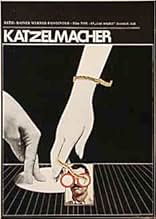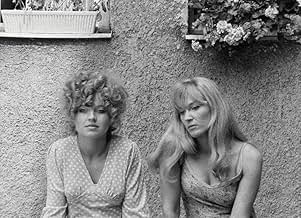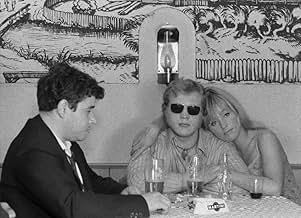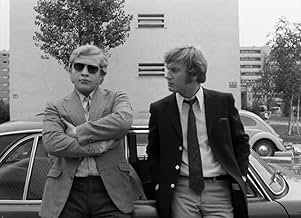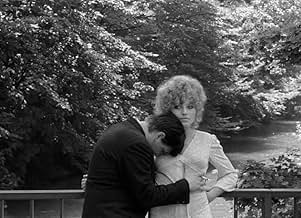Füge eine Handlung in deiner Sprache hinzuJorgos, a migrant worker from Greece, joins a group of young people in Munich usually hanging around. This foreigner incites hostility and jealousy among them, and he is insulted as a "Commu... Alles lesenJorgos, a migrant worker from Greece, joins a group of young people in Munich usually hanging around. This foreigner incites hostility and jealousy among them, and he is insulted as a "Communist" and "Greek dog". After having been attacked, Jorgos talks to Maria of his wish to re... Alles lesenJorgos, a migrant worker from Greece, joins a group of young people in Munich usually hanging around. This foreigner incites hostility and jealousy among them, and he is insulted as a "Communist" and "Greek dog". After having been attacked, Jorgos talks to Maria of his wish to return home.
- Regie
- Drehbuch
- Hauptbesetzung
- Auszeichnungen
- 8 Gewinne & 2 Nominierungen insgesamt
Empfohlene Bewertungen
Money also plays an important role overall. Those who have money are more oppressive and dominating. As if having money gives one more of a right to tell your partner what he or she should do in things that have nothing to do with money. Two of the men consider doing something illegal, that should bring big bucks. This was the cause for some quarrels with their women who found the idea appealing but didn't want to risk it. We never learn what it was they had planned and eventually they dropped the idea. But the relationships with their women were hurt permanently by this dispute.
Everyone seemed to have sex with everyone (except the ugly woman), without being much of an issue, but hey, it was 1969. In fact, it only was an issue when one of the women demanded money for it. It made her a whore, but the other women doing it for free didn't make them whores. Except for maybe the woman who was said to have sex with the guest-worker from Greece.
The scenes of always two different characters walking, with the melancholic music I understood this way that the two people talk differently to each other when they are among themselves. Always more tender, no matter which two people it were. But once there are at least three people the dynamics change for the worse.
At the beginning I found the film quite alien, because of the apparent disjointness of the scenes, but the better I knew the characters the more drawn in I was and I soon started to get something out of most scenes. It was also alien because I was not used to the way they talk. Pretty stagy in pronunciation and phrasing. This could possibly be contributed to the fact that the cast and writer/director Fassbinder all came from theater with little film experience at that point.
There was no sense of time. It just goes from one conversation to another. From the dialogue you could gather that a lot of time passed overall, but it isn't really important to know how much. It was just important for the movie so to not have the plot stagnating, to see different sides of the characters. Although it could also be argued again that you don't get a sense of time passing because Fassbinder didn't yet know any better, since he was rather new to the medium of film.
Thus the film becomes an engrossing social commentary on prejudice and the effects of that and of jumping to conclusions. As well as taking an anti-gossip stand. The film would be a wonderful example in illustrating the events of any countries racial issues.
In may be demanding of the viewer though. The long shots and an hour of simple conversation and savage romance become tedious. Hanging on through the whole film though will be rewarding.
There is a very strict and stiff approach to the filmmaking, the camera is almost always stationary, and certain scenes follow a specific "template" with regard to the cinematography in the respective sequences (i.e. Every scene that takes place in front of the house features the same exact perspective and mise en scene, etc). Also, the way Fassbinder utilizes his characters and actors is very "theatrical", sometimes characters almost become part of the mise en scene themselves, and there is always a "focus" on a specific character who is talking; rarely are two people's lines overlapping which, again, makes it very theatrical which is fitting, considering how this used to be a stage play.
So far everything I said is both something I can praise and criticize which is odd, but makes this an interesting film to say the least.
Where I do think the film becomes dated is in how it approaches its subject matter of xenophobia; in that regard I think Fassbinder's later works are just a lot better ('Ali: Fear Eats the Soul' for example). The Greek immigrant, played by Fassbinder himself, is somewhat of a tacky, cartoonish depiction of a foreigner in Germany and the character is very underdeveloped. I totally get that Fassbinder wanted to focus on the xenophobic Germans and their ugly behavior (even outside their racism), but again, 'Ali: Fear Eats the Soul' has proven that the overall topic can work better if you properly develop the characters and feature multiple views on the situation at hand, which leads to a better film overall.
There is also a brief fight scene that is honestly embarassing to look at given how poorly the punches and kicks were choreographed, a minor scene in the overall film, but the fact that I am still thinking about it proves that it could have been done better... To summarize, the film contains enough interesting elements to be worth checking out today, but with regard to its content, I think Fassbinder did a better job later on in his (admittedly short) career. Out of the films of his that i have seen, this may be the weakest, but it is not terrible either.
Another great character driven piece by the German maestro with the ugliest facets of human nature being explored as the members of the insular and narrow minded group start to spread rumours and make their prejudices known towards young Jorgos. After an innocuous chance meeting in the street with one of the women from the gang, the group's Chinese Whispers soon snowball to him having tried to rape her as well as other crimes such as him being a Communist.
The men of the group then seize their opportunity to beat him up for crimes he isn't guilty of.
Conformity, group hysteria and mobbing by the gang are all explored perceptively within Katzelmacher which makes it, unfortunately, ring all too true.
Beautifully acted, perfectly framed and directed and with a gorgeous late 60's black and white which is icy cool and absolutely gorgeous.
Look out for the scene of the young woman dancing.
Highly recommended.
Wusstest du schon
- WissenswertesShot in nine days.
- Crazy CreditsEs ist besser neue Fehler zu machen, als die alten bis zur allgemeinen Bewußtlosigkeit zu konstituieren (Yaak Karsunke)
Top-Auswahl
Details
Box Office
- Budget
- 80.000 DM (geschätzt)
- Bruttoertrag in den USA und Kanada
- 8.144 $
- Eröffnungswochenende in den USA und in Kanada
- 11.623 $
- 16. Feb. 2003
- Weltweiter Bruttoertrag
- 8.158 $
- Laufzeit
- 1 Std. 28 Min.(88 min)
- Farbe
- Sound-Mix
- Seitenverhältnis
- 1.37 : 1

